DMU Case Study: Examining Well-being's Role in Academic Achievement
VerifiedAdded on 2023/04/26
|73
|17451
|106
Report
AI Summary
This report investigates the connection between student well-being and academic achievement at De Montfort University (DMU). It explores the influence of positive psychology, focusing on social, psychological, and emotional dimensions of well-being. The study uses a quantitative approach, employing a survey questionnaire distributed among DMU students. Statistical methods like regression analysis and Pearson’s correlation are used to analyze the data. The findings indicate a positive relationship between well-being and academic success, highlighting issues like stress and emotional imbalance among students. The report concludes with recommendations such as enhanced student-teacher engagement to address cognitive aspects and improve support systems.
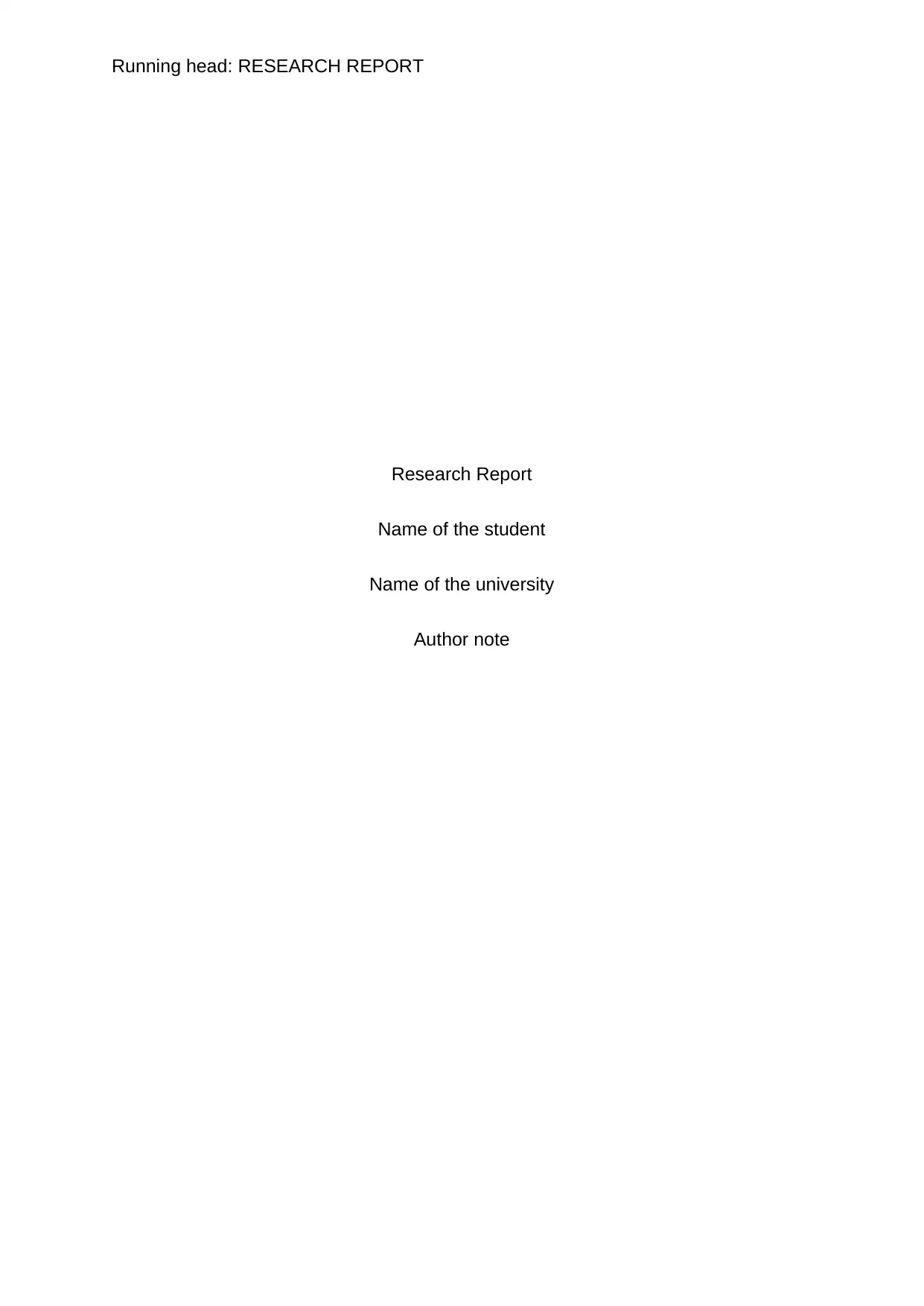
Running head: RESEARCH REPORT
Research Report
Name of the student
Name of the university
Author note
Research Report
Name of the student
Name of the university
Author note
Paraphrase This Document
Need a fresh take? Get an instant paraphrase of this document with our AI Paraphraser
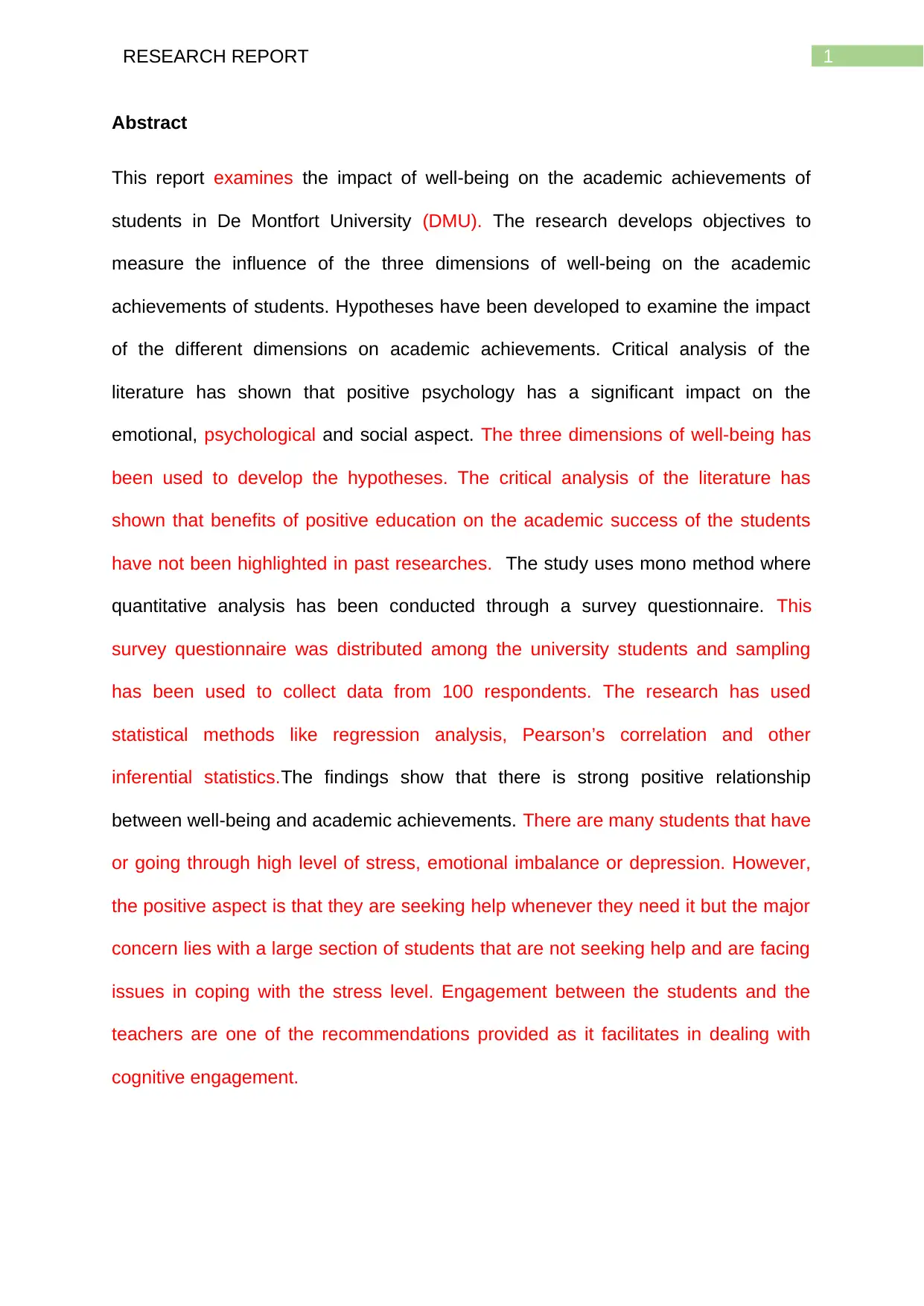
1RESEARCH REPORT
Abstract
This report examines the impact of well-being on the academic achievements of
students in De Montfort University (DMU). The research develops objectives to
measure the influence of the three dimensions of well-being on the academic
achievements of students. Hypotheses have been developed to examine the impact
of the different dimensions on academic achievements. Critical analysis of the
literature has shown that positive psychology has a significant impact on the
emotional, psychological and social aspect. The three dimensions of well-being has
been used to develop the hypotheses. The critical analysis of the literature has
shown that benefits of positive education on the academic success of the students
have not been highlighted in past researches. The study uses mono method where
quantitative analysis has been conducted through a survey questionnaire. This
survey questionnaire was distributed among the university students and sampling
has been used to collect data from 100 respondents. The research has used
statistical methods like regression analysis, Pearson’s correlation and other
inferential statistics.The findings show that there is strong positive relationship
between well-being and academic achievements. There are many students that have
or going through high level of stress, emotional imbalance or depression. However,
the positive aspect is that they are seeking help whenever they need it but the major
concern lies with a large section of students that are not seeking help and are facing
issues in coping with the stress level. Engagement between the students and the
teachers are one of the recommendations provided as it facilitates in dealing with
cognitive engagement.
Abstract
This report examines the impact of well-being on the academic achievements of
students in De Montfort University (DMU). The research develops objectives to
measure the influence of the three dimensions of well-being on the academic
achievements of students. Hypotheses have been developed to examine the impact
of the different dimensions on academic achievements. Critical analysis of the
literature has shown that positive psychology has a significant impact on the
emotional, psychological and social aspect. The three dimensions of well-being has
been used to develop the hypotheses. The critical analysis of the literature has
shown that benefits of positive education on the academic success of the students
have not been highlighted in past researches. The study uses mono method where
quantitative analysis has been conducted through a survey questionnaire. This
survey questionnaire was distributed among the university students and sampling
has been used to collect data from 100 respondents. The research has used
statistical methods like regression analysis, Pearson’s correlation and other
inferential statistics.The findings show that there is strong positive relationship
between well-being and academic achievements. There are many students that have
or going through high level of stress, emotional imbalance or depression. However,
the positive aspect is that they are seeking help whenever they need it but the major
concern lies with a large section of students that are not seeking help and are facing
issues in coping with the stress level. Engagement between the students and the
teachers are one of the recommendations provided as it facilitates in dealing with
cognitive engagement.
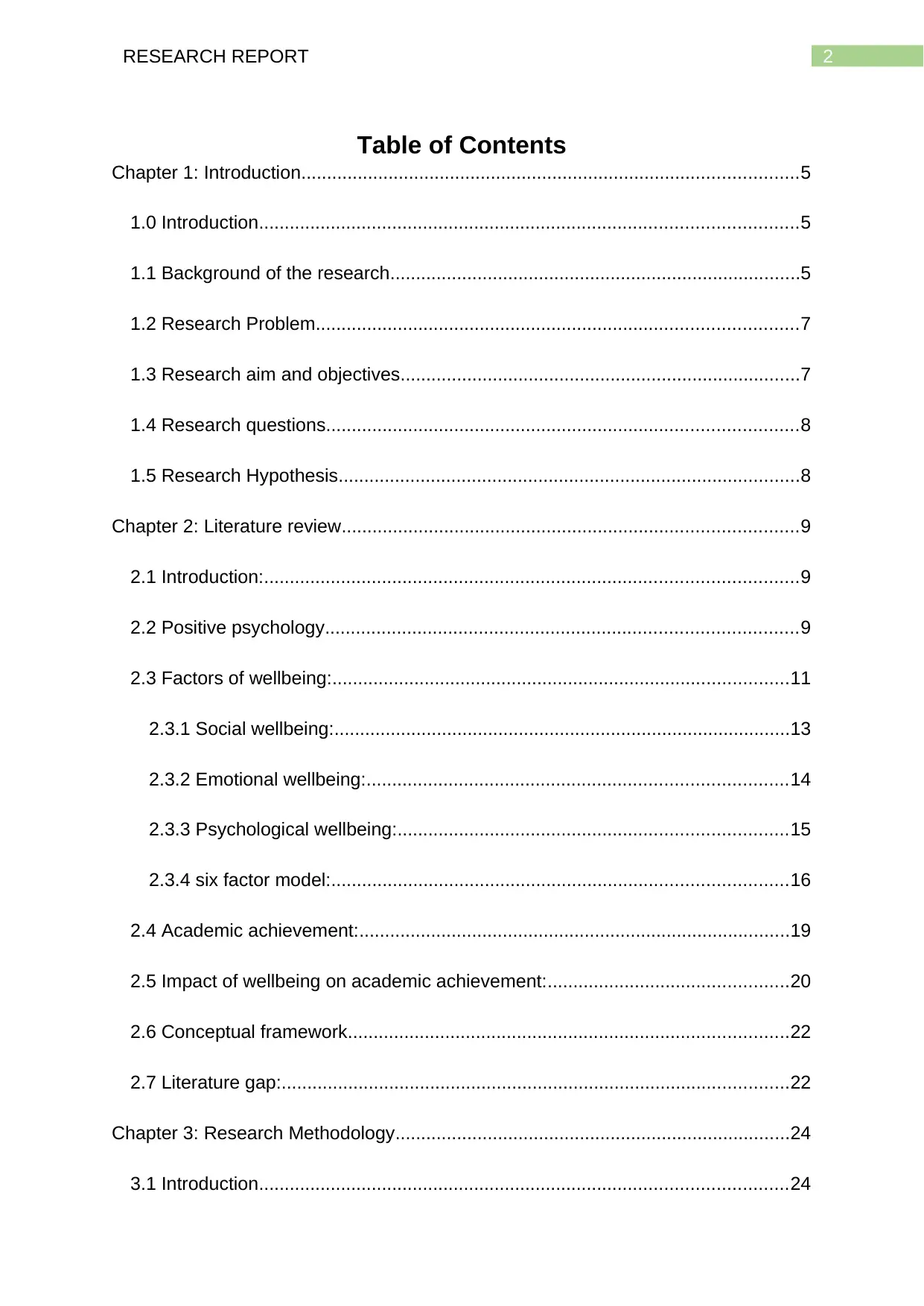
2RESEARCH REPORT
Table of Contents
Chapter 1: Introduction.................................................................................................5
1.0 Introduction.........................................................................................................5
1.1 Background of the research................................................................................5
1.2 Research Problem..............................................................................................7
1.3 Research aim and objectives..............................................................................7
1.4 Research questions............................................................................................8
1.5 Research Hypothesis..........................................................................................8
Chapter 2: Literature review.........................................................................................9
2.1 Introduction:........................................................................................................9
2.2 Positive psychology............................................................................................9
2.3 Factors of wellbeing:.........................................................................................11
2.3.1 Social wellbeing:.........................................................................................13
2.3.2 Emotional wellbeing:..................................................................................14
2.3.3 Psychological wellbeing:............................................................................15
2.3.4 six factor model:.........................................................................................16
2.4 Academic achievement:....................................................................................19
2.5 Impact of wellbeing on academic achievement:...............................................20
2.6 Conceptual framework......................................................................................22
2.7 Literature gap:...................................................................................................22
Chapter 3: Research Methodology.............................................................................24
3.1 Introduction.......................................................................................................24
Table of Contents
Chapter 1: Introduction.................................................................................................5
1.0 Introduction.........................................................................................................5
1.1 Background of the research................................................................................5
1.2 Research Problem..............................................................................................7
1.3 Research aim and objectives..............................................................................7
1.4 Research questions............................................................................................8
1.5 Research Hypothesis..........................................................................................8
Chapter 2: Literature review.........................................................................................9
2.1 Introduction:........................................................................................................9
2.2 Positive psychology............................................................................................9
2.3 Factors of wellbeing:.........................................................................................11
2.3.1 Social wellbeing:.........................................................................................13
2.3.2 Emotional wellbeing:..................................................................................14
2.3.3 Psychological wellbeing:............................................................................15
2.3.4 six factor model:.........................................................................................16
2.4 Academic achievement:....................................................................................19
2.5 Impact of wellbeing on academic achievement:...............................................20
2.6 Conceptual framework......................................................................................22
2.7 Literature gap:...................................................................................................22
Chapter 3: Research Methodology.............................................................................24
3.1 Introduction.......................................................................................................24
⊘ This is a preview!⊘
Do you want full access?
Subscribe today to unlock all pages.

Trusted by 1+ million students worldwide
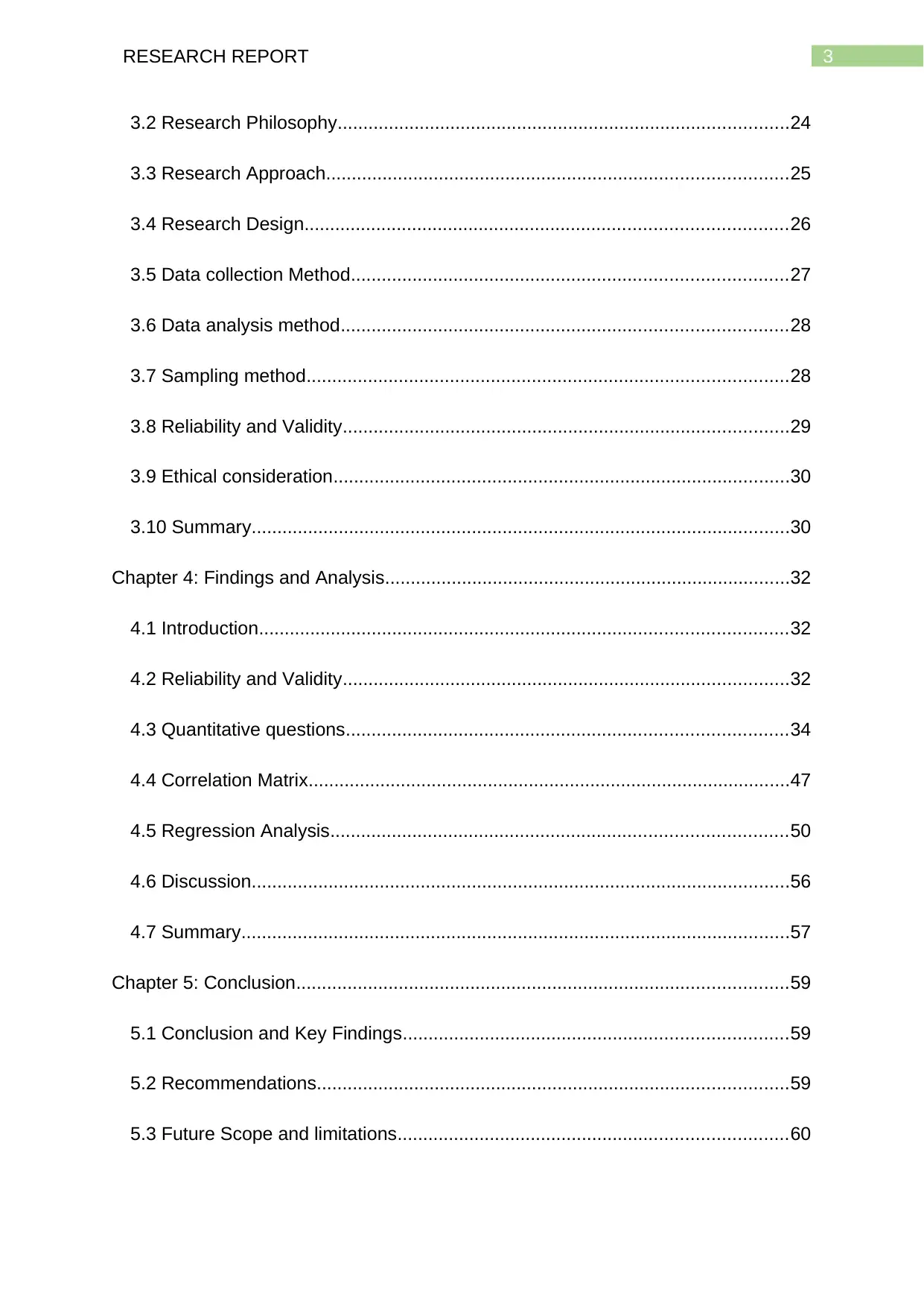
3RESEARCH REPORT
3.2 Research Philosophy........................................................................................24
3.3 Research Approach..........................................................................................25
3.4 Research Design..............................................................................................26
3.5 Data collection Method.....................................................................................27
3.6 Data analysis method.......................................................................................28
3.7 Sampling method..............................................................................................28
3.8 Reliability and Validity.......................................................................................29
3.9 Ethical consideration.........................................................................................30
3.10 Summary.........................................................................................................30
Chapter 4: Findings and Analysis...............................................................................32
4.1 Introduction.......................................................................................................32
4.2 Reliability and Validity.......................................................................................32
4.3 Quantitative questions......................................................................................34
4.4 Correlation Matrix..............................................................................................47
4.5 Regression Analysis.........................................................................................50
4.6 Discussion.........................................................................................................56
4.7 Summary...........................................................................................................57
Chapter 5: Conclusion................................................................................................59
5.1 Conclusion and Key Findings...........................................................................59
5.2 Recommendations............................................................................................59
5.3 Future Scope and limitations............................................................................60
3.2 Research Philosophy........................................................................................24
3.3 Research Approach..........................................................................................25
3.4 Research Design..............................................................................................26
3.5 Data collection Method.....................................................................................27
3.6 Data analysis method.......................................................................................28
3.7 Sampling method..............................................................................................28
3.8 Reliability and Validity.......................................................................................29
3.9 Ethical consideration.........................................................................................30
3.10 Summary.........................................................................................................30
Chapter 4: Findings and Analysis...............................................................................32
4.1 Introduction.......................................................................................................32
4.2 Reliability and Validity.......................................................................................32
4.3 Quantitative questions......................................................................................34
4.4 Correlation Matrix..............................................................................................47
4.5 Regression Analysis.........................................................................................50
4.6 Discussion.........................................................................................................56
4.7 Summary...........................................................................................................57
Chapter 5: Conclusion................................................................................................59
5.1 Conclusion and Key Findings...........................................................................59
5.2 Recommendations............................................................................................59
5.3 Future Scope and limitations............................................................................60
Paraphrase This Document
Need a fresh take? Get an instant paraphrase of this document with our AI Paraphraser

4RESEARCH REPORT
5.4 Reflection..........................................................................................................60
References.................................................................................................................63
Appendices.................................................................................................................70
5.4 Reflection..........................................................................................................60
References.................................................................................................................63
Appendices.................................................................................................................70
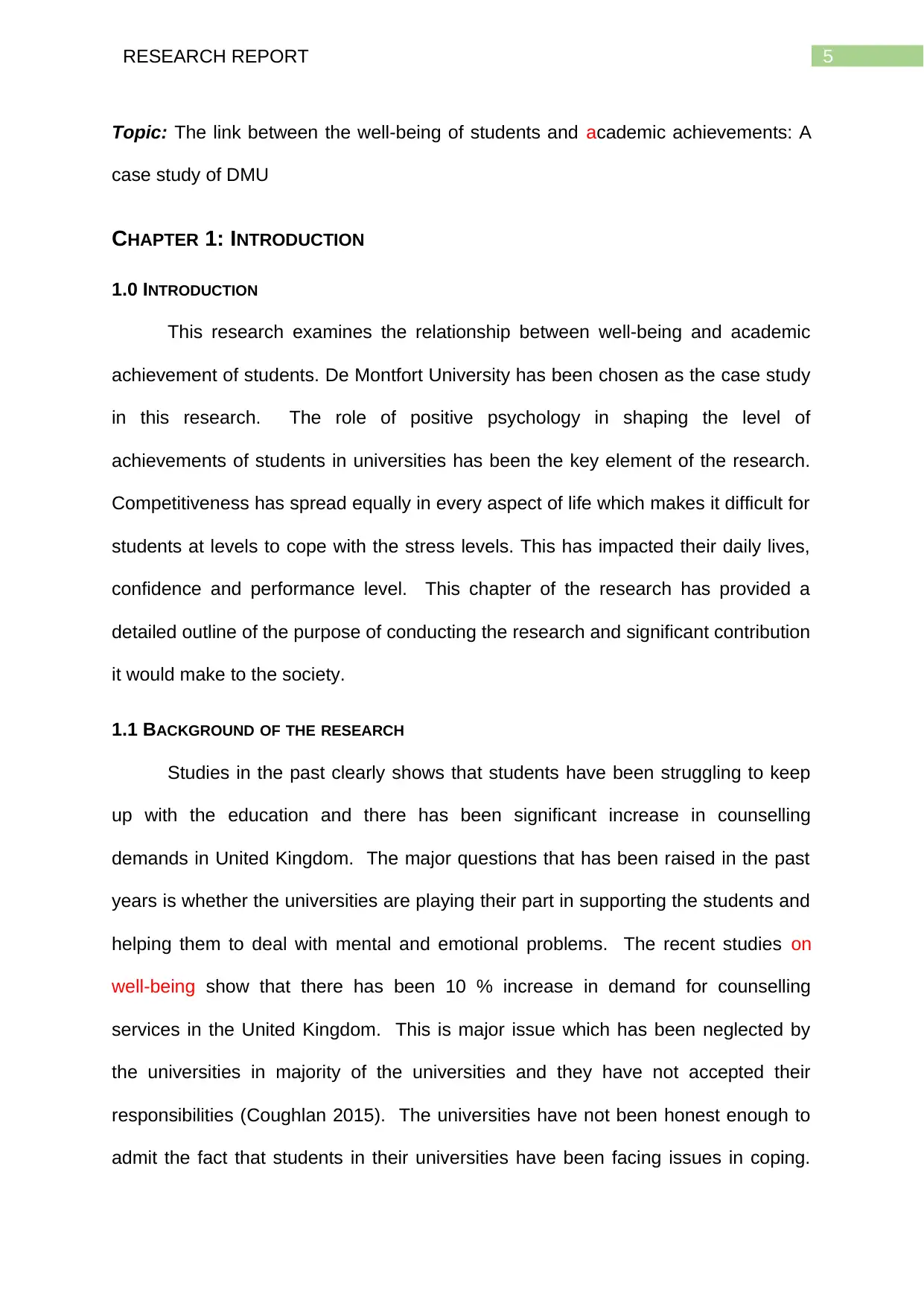
5RESEARCH REPORT
Topic: The link between the well-being of students and academic achievements: A
case study of DMU
CHAPTER 1: INTRODUCTION
1.0 INTRODUCTION
This research examines the relationship between well-being and academic
achievement of students. De Montfort University has been chosen as the case study
in this research. The role of positive psychology in shaping the level of
achievements of students in universities has been the key element of the research.
Competitiveness has spread equally in every aspect of life which makes it difficult for
students at levels to cope with the stress levels. This has impacted their daily lives,
confidence and performance level. This chapter of the research has provided a
detailed outline of the purpose of conducting the research and significant contribution
it would make to the society.
1.1 BACKGROUND OF THE RESEARCH
Studies in the past clearly shows that students have been struggling to keep
up with the education and there has been significant increase in counselling
demands in United Kingdom. The major questions that has been raised in the past
years is whether the universities are playing their part in supporting the students and
helping them to deal with mental and emotional problems. The recent studies on
well-being show that there has been 10 % increase in demand for counselling
services in the United Kingdom. This is major issue which has been neglected by
the universities in majority of the universities and they have not accepted their
responsibilities (Coughlan 2015). The universities have not been honest enough to
admit the fact that students in their universities have been facing issues in coping.
Topic: The link between the well-being of students and academic achievements: A
case study of DMU
CHAPTER 1: INTRODUCTION
1.0 INTRODUCTION
This research examines the relationship between well-being and academic
achievement of students. De Montfort University has been chosen as the case study
in this research. The role of positive psychology in shaping the level of
achievements of students in universities has been the key element of the research.
Competitiveness has spread equally in every aspect of life which makes it difficult for
students at levels to cope with the stress levels. This has impacted their daily lives,
confidence and performance level. This chapter of the research has provided a
detailed outline of the purpose of conducting the research and significant contribution
it would make to the society.
1.1 BACKGROUND OF THE RESEARCH
Studies in the past clearly shows that students have been struggling to keep
up with the education and there has been significant increase in counselling
demands in United Kingdom. The major questions that has been raised in the past
years is whether the universities are playing their part in supporting the students and
helping them to deal with mental and emotional problems. The recent studies on
well-being show that there has been 10 % increase in demand for counselling
services in the United Kingdom. This is major issue which has been neglected by
the universities in majority of the universities and they have not accepted their
responsibilities (Coughlan 2015). The universities have not been honest enough to
admit the fact that students in their universities have been facing issues in coping.
⊘ This is a preview!⊘
Do you want full access?
Subscribe today to unlock all pages.

Trusted by 1+ million students worldwide
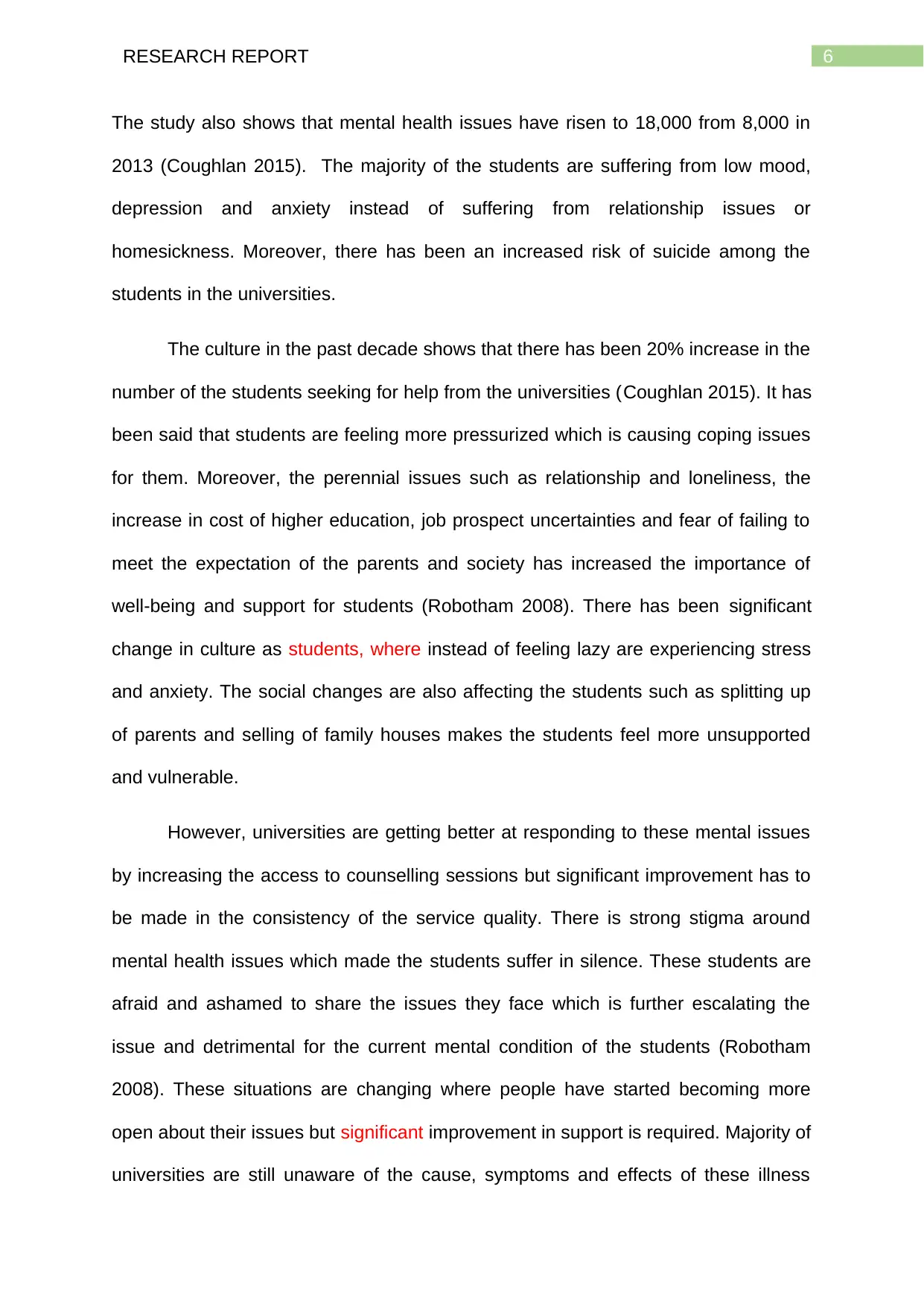
6RESEARCH REPORT
The study also shows that mental health issues have risen to 18,000 from 8,000 in
2013 (Coughlan 2015). The majority of the students are suffering from low mood,
depression and anxiety instead of suffering from relationship issues or
homesickness. Moreover, there has been an increased risk of suicide among the
students in the universities.
The culture in the past decade shows that there has been 20% increase in the
number of the students seeking for help from the universities (Coughlan 2015). It has
been said that students are feeling more pressurized which is causing coping issues
for them. Moreover, the perennial issues such as relationship and loneliness, the
increase in cost of higher education, job prospect uncertainties and fear of failing to
meet the expectation of the parents and society has increased the importance of
well-being and support for students (Robotham 2008). There has been significant
change in culture as students, where instead of feeling lazy are experiencing stress
and anxiety. The social changes are also affecting the students such as splitting up
of parents and selling of family houses makes the students feel more unsupported
and vulnerable.
However, universities are getting better at responding to these mental issues
by increasing the access to counselling sessions but significant improvement has to
be made in the consistency of the service quality. There is strong stigma around
mental health issues which made the students suffer in silence. These students are
afraid and ashamed to share the issues they face which is further escalating the
issue and detrimental for the current mental condition of the students (Robotham
2008). These situations are changing where people have started becoming more
open about their issues but significant improvement in support is required. Majority of
universities are still unaware of the cause, symptoms and effects of these illness
The study also shows that mental health issues have risen to 18,000 from 8,000 in
2013 (Coughlan 2015). The majority of the students are suffering from low mood,
depression and anxiety instead of suffering from relationship issues or
homesickness. Moreover, there has been an increased risk of suicide among the
students in the universities.
The culture in the past decade shows that there has been 20% increase in the
number of the students seeking for help from the universities (Coughlan 2015). It has
been said that students are feeling more pressurized which is causing coping issues
for them. Moreover, the perennial issues such as relationship and loneliness, the
increase in cost of higher education, job prospect uncertainties and fear of failing to
meet the expectation of the parents and society has increased the importance of
well-being and support for students (Robotham 2008). There has been significant
change in culture as students, where instead of feeling lazy are experiencing stress
and anxiety. The social changes are also affecting the students such as splitting up
of parents and selling of family houses makes the students feel more unsupported
and vulnerable.
However, universities are getting better at responding to these mental issues
by increasing the access to counselling sessions but significant improvement has to
be made in the consistency of the service quality. There is strong stigma around
mental health issues which made the students suffer in silence. These students are
afraid and ashamed to share the issues they face which is further escalating the
issue and detrimental for the current mental condition of the students (Robotham
2008). These situations are changing where people have started becoming more
open about their issues but significant improvement in support is required. Majority of
universities are still unaware of the cause, symptoms and effects of these illness
Paraphrase This Document
Need a fresh take? Get an instant paraphrase of this document with our AI Paraphraser
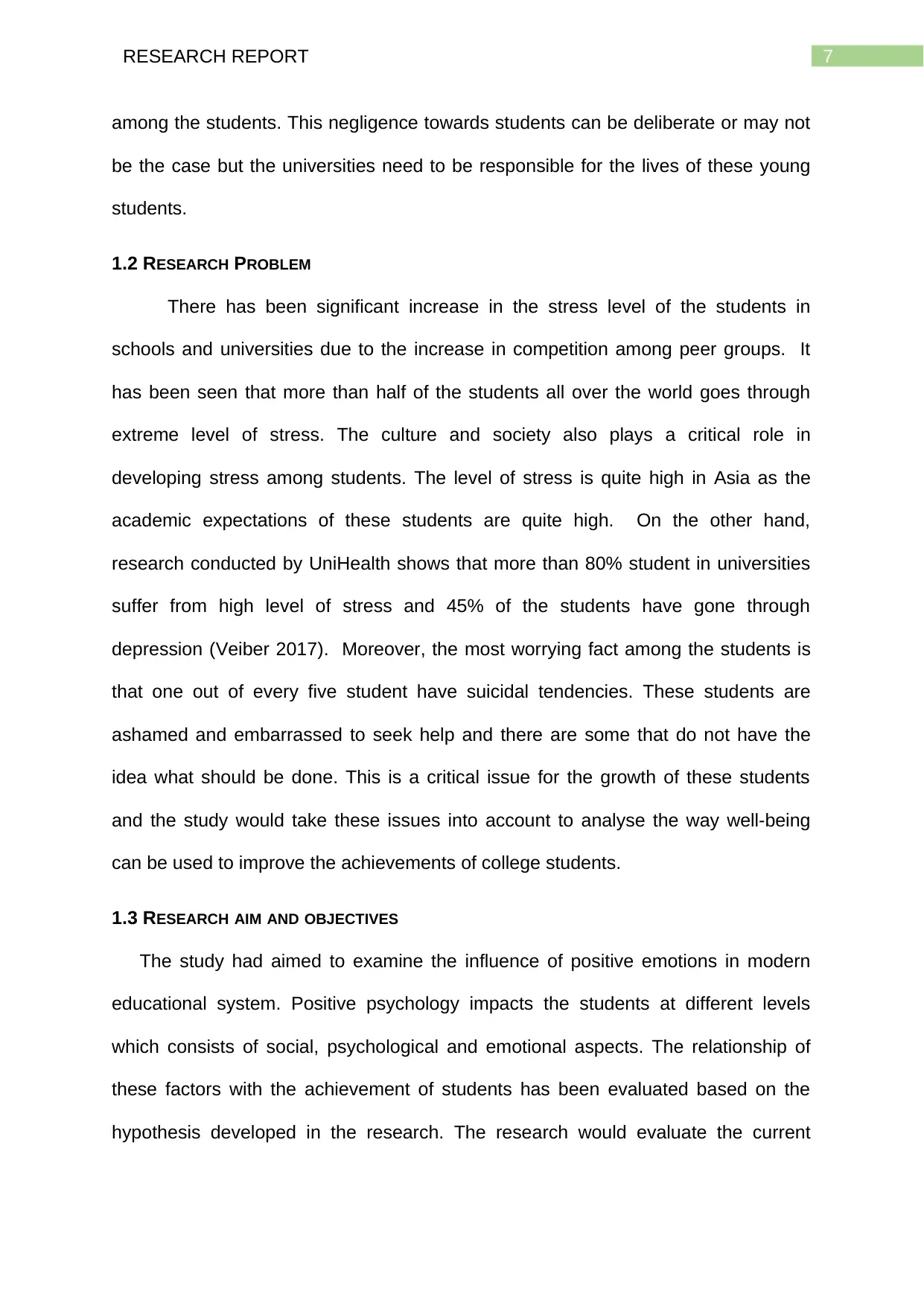
7RESEARCH REPORT
among the students. This negligence towards students can be deliberate or may not
be the case but the universities need to be responsible for the lives of these young
students.
1.2 RESEARCH PROBLEM
There has been significant increase in the stress level of the students in
schools and universities due to the increase in competition among peer groups. It
has been seen that more than half of the students all over the world goes through
extreme level of stress. The culture and society also plays a critical role in
developing stress among students. The level of stress is quite high in Asia as the
academic expectations of these students are quite high. On the other hand,
research conducted by UniHealth shows that more than 80% student in universities
suffer from high level of stress and 45% of the students have gone through
depression (Veiber 2017). Moreover, the most worrying fact among the students is
that one out of every five student have suicidal tendencies. These students are
ashamed and embarrassed to seek help and there are some that do not have the
idea what should be done. This is a critical issue for the growth of these students
and the study would take these issues into account to analyse the way well-being
can be used to improve the achievements of college students.
1.3 RESEARCH AIM AND OBJECTIVES
The study had aimed to examine the influence of positive emotions in modern
educational system. Positive psychology impacts the students at different levels
which consists of social, psychological and emotional aspects. The relationship of
these factors with the achievement of students has been evaluated based on the
hypothesis developed in the research. The research would evaluate the current
among the students. This negligence towards students can be deliberate or may not
be the case but the universities need to be responsible for the lives of these young
students.
1.2 RESEARCH PROBLEM
There has been significant increase in the stress level of the students in
schools and universities due to the increase in competition among peer groups. It
has been seen that more than half of the students all over the world goes through
extreme level of stress. The culture and society also plays a critical role in
developing stress among students. The level of stress is quite high in Asia as the
academic expectations of these students are quite high. On the other hand,
research conducted by UniHealth shows that more than 80% student in universities
suffer from high level of stress and 45% of the students have gone through
depression (Veiber 2017). Moreover, the most worrying fact among the students is
that one out of every five student have suicidal tendencies. These students are
ashamed and embarrassed to seek help and there are some that do not have the
idea what should be done. This is a critical issue for the growth of these students
and the study would take these issues into account to analyse the way well-being
can be used to improve the achievements of college students.
1.3 RESEARCH AIM AND OBJECTIVES
The study had aimed to examine the influence of positive emotions in modern
educational system. Positive psychology impacts the students at different levels
which consists of social, psychological and emotional aspects. The relationship of
these factors with the achievement of students has been evaluated based on the
hypothesis developed in the research. The research would evaluate the current
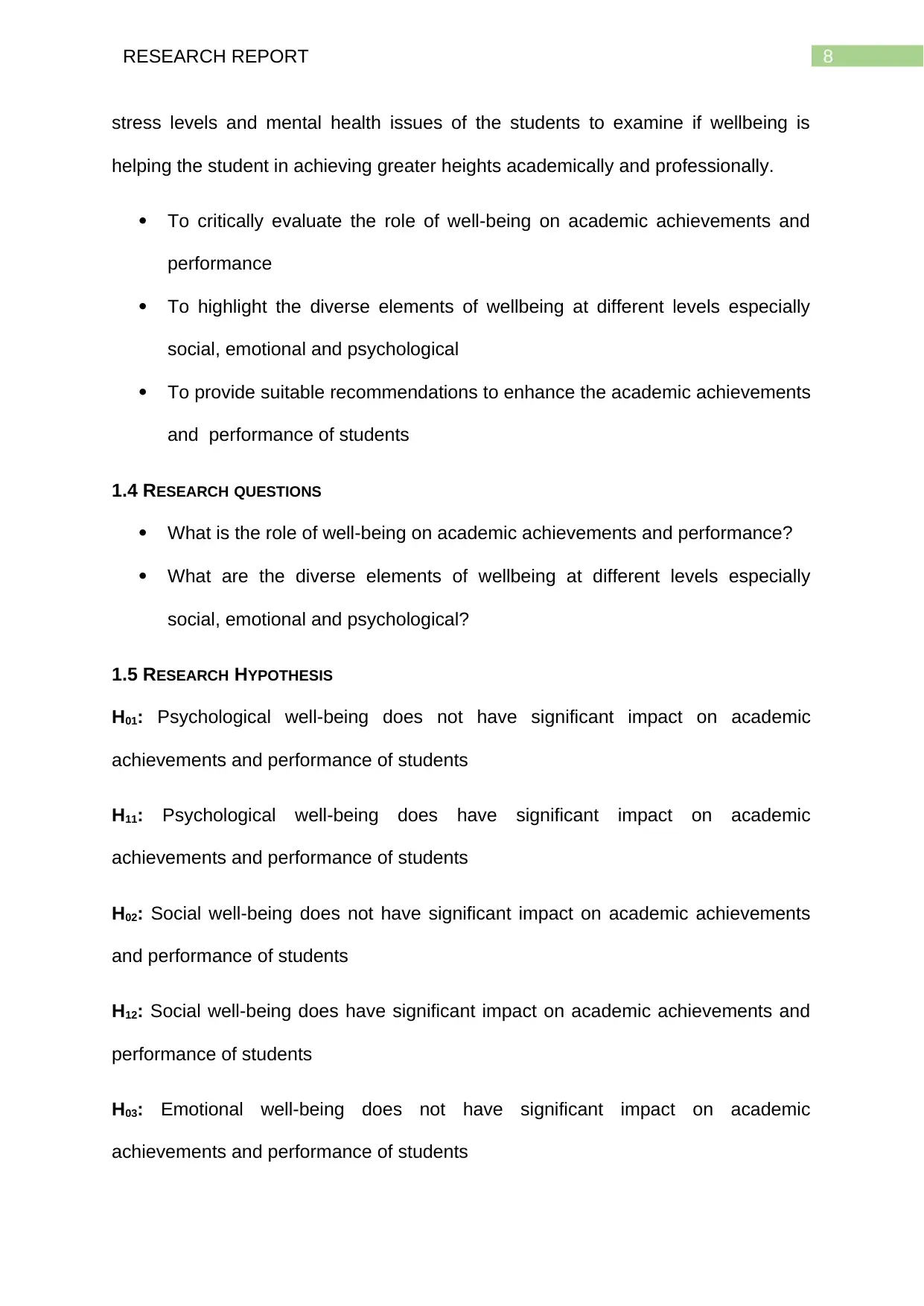
8RESEARCH REPORT
stress levels and mental health issues of the students to examine if wellbeing is
helping the student in achieving greater heights academically and professionally.
To critically evaluate the role of well-being on academic achievements and
performance
To highlight the diverse elements of wellbeing at different levels especially
social, emotional and psychological
To provide suitable recommendations to enhance the academic achievements
and performance of students
1.4 RESEARCH QUESTIONS
What is the role of well-being on academic achievements and performance?
What are the diverse elements of wellbeing at different levels especially
social, emotional and psychological?
1.5 RESEARCH HYPOTHESIS
H01: Psychological well-being does not have significant impact on academic
achievements and performance of students
H11: Psychological well-being does have significant impact on academic
achievements and performance of students
H02: Social well-being does not have significant impact on academic achievements
and performance of students
H12: Social well-being does have significant impact on academic achievements and
performance of students
H03: Emotional well-being does not have significant impact on academic
achievements and performance of students
stress levels and mental health issues of the students to examine if wellbeing is
helping the student in achieving greater heights academically and professionally.
To critically evaluate the role of well-being on academic achievements and
performance
To highlight the diverse elements of wellbeing at different levels especially
social, emotional and psychological
To provide suitable recommendations to enhance the academic achievements
and performance of students
1.4 RESEARCH QUESTIONS
What is the role of well-being on academic achievements and performance?
What are the diverse elements of wellbeing at different levels especially
social, emotional and psychological?
1.5 RESEARCH HYPOTHESIS
H01: Psychological well-being does not have significant impact on academic
achievements and performance of students
H11: Psychological well-being does have significant impact on academic
achievements and performance of students
H02: Social well-being does not have significant impact on academic achievements
and performance of students
H12: Social well-being does have significant impact on academic achievements and
performance of students
H03: Emotional well-being does not have significant impact on academic
achievements and performance of students
⊘ This is a preview!⊘
Do you want full access?
Subscribe today to unlock all pages.

Trusted by 1+ million students worldwide
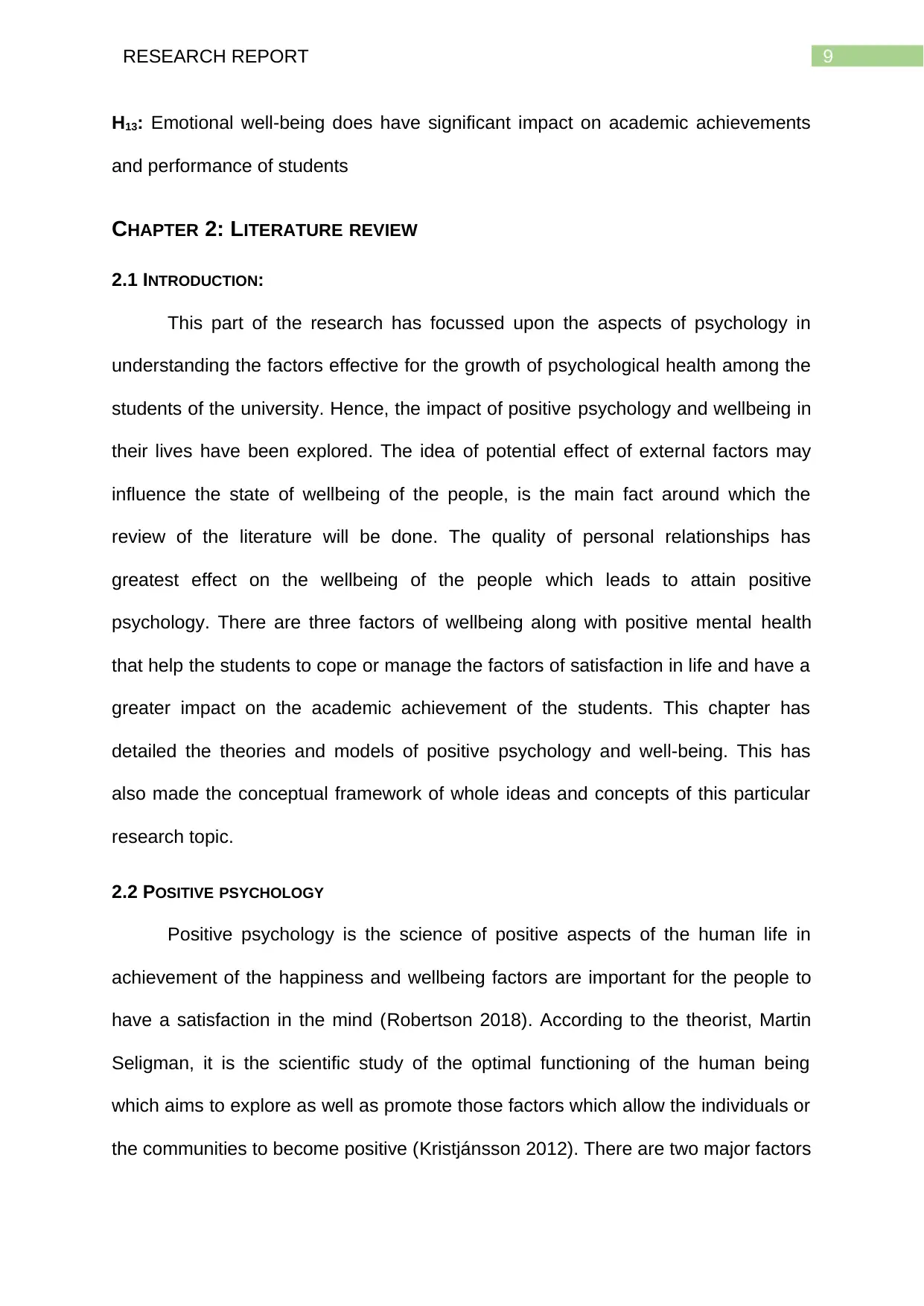
9RESEARCH REPORT
H13: Emotional well-being does have significant impact on academic achievements
and performance of students
CHAPTER 2: LITERATURE REVIEW
2.1 INTRODUCTION:
This part of the research has focussed upon the aspects of psychology in
understanding the factors effective for the growth of psychological health among the
students of the university. Hence, the impact of positive psychology and wellbeing in
their lives have been explored. The idea of potential effect of external factors may
influence the state of wellbeing of the people, is the main fact around which the
review of the literature will be done. The quality of personal relationships has
greatest effect on the wellbeing of the people which leads to attain positive
psychology. There are three factors of wellbeing along with positive mental health
that help the students to cope or manage the factors of satisfaction in life and have a
greater impact on the academic achievement of the students. This chapter has
detailed the theories and models of positive psychology and well-being. This has
also made the conceptual framework of whole ideas and concepts of this particular
research topic.
2.2 POSITIVE PSYCHOLOGY
Positive psychology is the science of positive aspects of the human life in
achievement of the happiness and wellbeing factors are important for the people to
have a satisfaction in the mind (Robertson 2018). According to the theorist, Martin
Seligman, it is the scientific study of the optimal functioning of the human being
which aims to explore as well as promote those factors which allow the individuals or
the communities to become positive (Kristjánsson 2012). There are two major factors
H13: Emotional well-being does have significant impact on academic achievements
and performance of students
CHAPTER 2: LITERATURE REVIEW
2.1 INTRODUCTION:
This part of the research has focussed upon the aspects of psychology in
understanding the factors effective for the growth of psychological health among the
students of the university. Hence, the impact of positive psychology and wellbeing in
their lives have been explored. The idea of potential effect of external factors may
influence the state of wellbeing of the people, is the main fact around which the
review of the literature will be done. The quality of personal relationships has
greatest effect on the wellbeing of the people which leads to attain positive
psychology. There are three factors of wellbeing along with positive mental health
that help the students to cope or manage the factors of satisfaction in life and have a
greater impact on the academic achievement of the students. This chapter has
detailed the theories and models of positive psychology and well-being. This has
also made the conceptual framework of whole ideas and concepts of this particular
research topic.
2.2 POSITIVE PSYCHOLOGY
Positive psychology is the science of positive aspects of the human life in
achievement of the happiness and wellbeing factors are important for the people to
have a satisfaction in the mind (Robertson 2018). According to the theorist, Martin
Seligman, it is the scientific study of the optimal functioning of the human being
which aims to explore as well as promote those factors which allow the individuals or
the communities to become positive (Kristjánsson 2012). There are two major factors
Paraphrase This Document
Need a fresh take? Get an instant paraphrase of this document with our AI Paraphraser
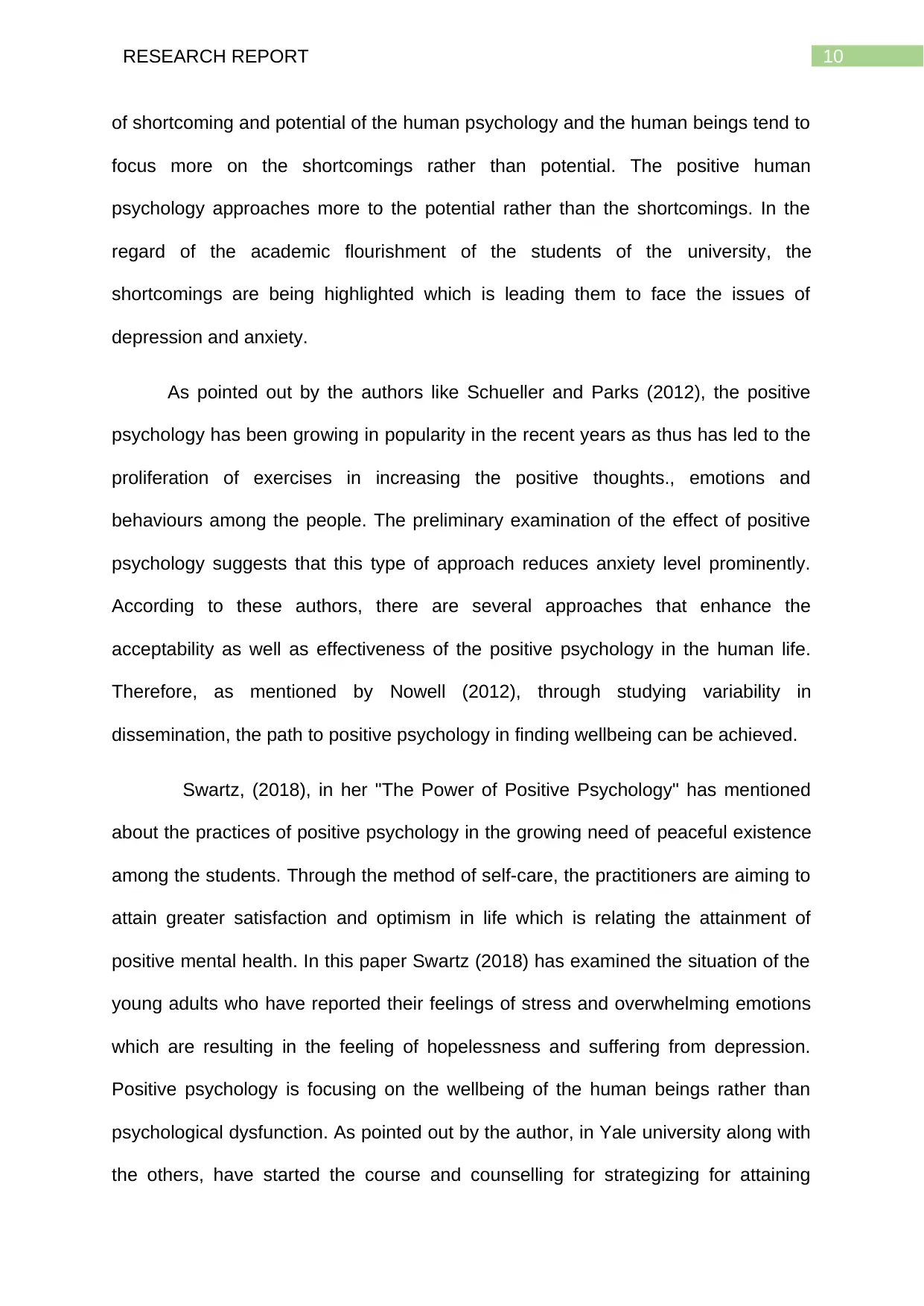
10RESEARCH REPORT
of shortcoming and potential of the human psychology and the human beings tend to
focus more on the shortcomings rather than potential. The positive human
psychology approaches more to the potential rather than the shortcomings. In the
regard of the academic flourishment of the students of the university, the
shortcomings are being highlighted which is leading them to face the issues of
depression and anxiety.
As pointed out by the authors like Schueller and Parks (2012), the positive
psychology has been growing in popularity in the recent years as thus has led to the
proliferation of exercises in increasing the positive thoughts., emotions and
behaviours among the people. The preliminary examination of the effect of positive
psychology suggests that this type of approach reduces anxiety level prominently.
According to these authors, there are several approaches that enhance the
acceptability as well as effectiveness of the positive psychology in the human life.
Therefore, as mentioned by Nowell (2012), through studying variability in
dissemination, the path to positive psychology in finding wellbeing can be achieved.
Swartz, (2018), in her "The Power of Positive Psychology" has mentioned
about the practices of positive psychology in the growing need of peaceful existence
among the students. Through the method of self-care, the practitioners are aiming to
attain greater satisfaction and optimism in life which is relating the attainment of
positive mental health. In this paper Swartz (2018) has examined the situation of the
young adults who have reported their feelings of stress and overwhelming emotions
which are resulting in the feeling of hopelessness and suffering from depression.
Positive psychology is focusing on the wellbeing of the human beings rather than
psychological dysfunction. As pointed out by the author, in Yale university along with
the others, have started the course and counselling for strategizing for attaining
of shortcoming and potential of the human psychology and the human beings tend to
focus more on the shortcomings rather than potential. The positive human
psychology approaches more to the potential rather than the shortcomings. In the
regard of the academic flourishment of the students of the university, the
shortcomings are being highlighted which is leading them to face the issues of
depression and anxiety.
As pointed out by the authors like Schueller and Parks (2012), the positive
psychology has been growing in popularity in the recent years as thus has led to the
proliferation of exercises in increasing the positive thoughts., emotions and
behaviours among the people. The preliminary examination of the effect of positive
psychology suggests that this type of approach reduces anxiety level prominently.
According to these authors, there are several approaches that enhance the
acceptability as well as effectiveness of the positive psychology in the human life.
Therefore, as mentioned by Nowell (2012), through studying variability in
dissemination, the path to positive psychology in finding wellbeing can be achieved.
Swartz, (2018), in her "The Power of Positive Psychology" has mentioned
about the practices of positive psychology in the growing need of peaceful existence
among the students. Through the method of self-care, the practitioners are aiming to
attain greater satisfaction and optimism in life which is relating the attainment of
positive mental health. In this paper Swartz (2018) has examined the situation of the
young adults who have reported their feelings of stress and overwhelming emotions
which are resulting in the feeling of hopelessness and suffering from depression.
Positive psychology is focusing on the wellbeing of the human beings rather than
psychological dysfunction. As pointed out by the author, in Yale university along with
the others, have started the course and counselling for strategizing for attaining
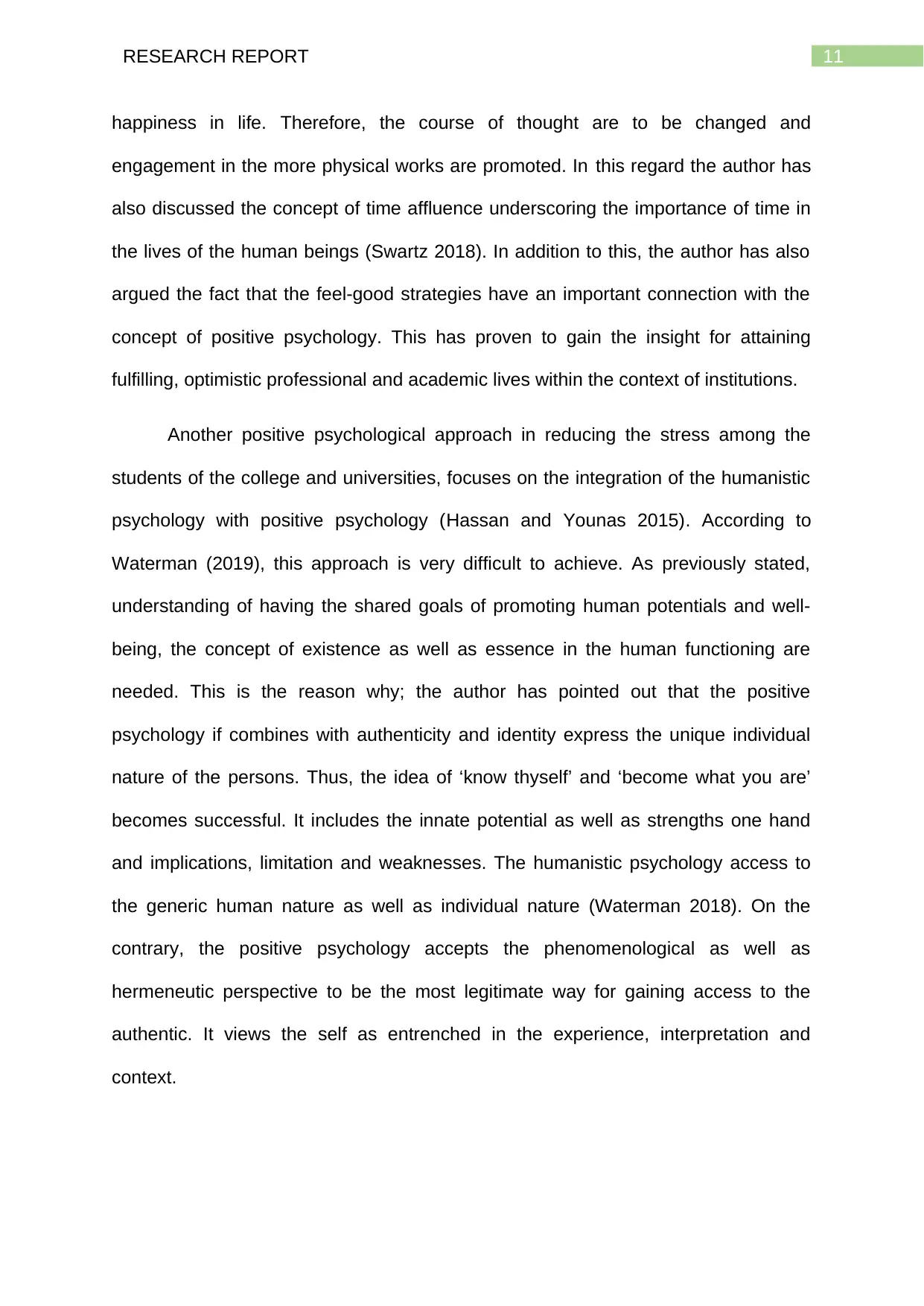
11RESEARCH REPORT
happiness in life. Therefore, the course of thought are to be changed and
engagement in the more physical works are promoted. In this regard the author has
also discussed the concept of time affluence underscoring the importance of time in
the lives of the human beings (Swartz 2018). In addition to this, the author has also
argued the fact that the feel-good strategies have an important connection with the
concept of positive psychology. This has proven to gain the insight for attaining
fulfilling, optimistic professional and academic lives within the context of institutions.
Another positive psychological approach in reducing the stress among the
students of the college and universities, focuses on the integration of the humanistic
psychology with positive psychology (Hassan and Younas 2015). According to
Waterman (2019), this approach is very difficult to achieve. As previously stated,
understanding of having the shared goals of promoting human potentials and well-
being, the concept of existence as well as essence in the human functioning are
needed. This is the reason why; the author has pointed out that the positive
psychology if combines with authenticity and identity express the unique individual
nature of the persons. Thus, the idea of ‘know thyself’ and ‘become what you are’
becomes successful. It includes the innate potential as well as strengths one hand
and implications, limitation and weaknesses. The humanistic psychology access to
the generic human nature as well as individual nature (Waterman 2018). On the
contrary, the positive psychology accepts the phenomenological as well as
hermeneutic perspective to be the most legitimate way for gaining access to the
authentic. It views the self as entrenched in the experience, interpretation and
context.
happiness in life. Therefore, the course of thought are to be changed and
engagement in the more physical works are promoted. In this regard the author has
also discussed the concept of time affluence underscoring the importance of time in
the lives of the human beings (Swartz 2018). In addition to this, the author has also
argued the fact that the feel-good strategies have an important connection with the
concept of positive psychology. This has proven to gain the insight for attaining
fulfilling, optimistic professional and academic lives within the context of institutions.
Another positive psychological approach in reducing the stress among the
students of the college and universities, focuses on the integration of the humanistic
psychology with positive psychology (Hassan and Younas 2015). According to
Waterman (2019), this approach is very difficult to achieve. As previously stated,
understanding of having the shared goals of promoting human potentials and well-
being, the concept of existence as well as essence in the human functioning are
needed. This is the reason why; the author has pointed out that the positive
psychology if combines with authenticity and identity express the unique individual
nature of the persons. Thus, the idea of ‘know thyself’ and ‘become what you are’
becomes successful. It includes the innate potential as well as strengths one hand
and implications, limitation and weaknesses. The humanistic psychology access to
the generic human nature as well as individual nature (Waterman 2018). On the
contrary, the positive psychology accepts the phenomenological as well as
hermeneutic perspective to be the most legitimate way for gaining access to the
authentic. It views the self as entrenched in the experience, interpretation and
context.
⊘ This is a preview!⊘
Do you want full access?
Subscribe today to unlock all pages.

Trusted by 1+ million students worldwide
1 out of 73
Related Documents
Your All-in-One AI-Powered Toolkit for Academic Success.
+13062052269
info@desklib.com
Available 24*7 on WhatsApp / Email
![[object Object]](/_next/static/media/star-bottom.7253800d.svg)
Unlock your academic potential
Copyright © 2020–2025 A2Z Services. All Rights Reserved. Developed and managed by ZUCOL.





